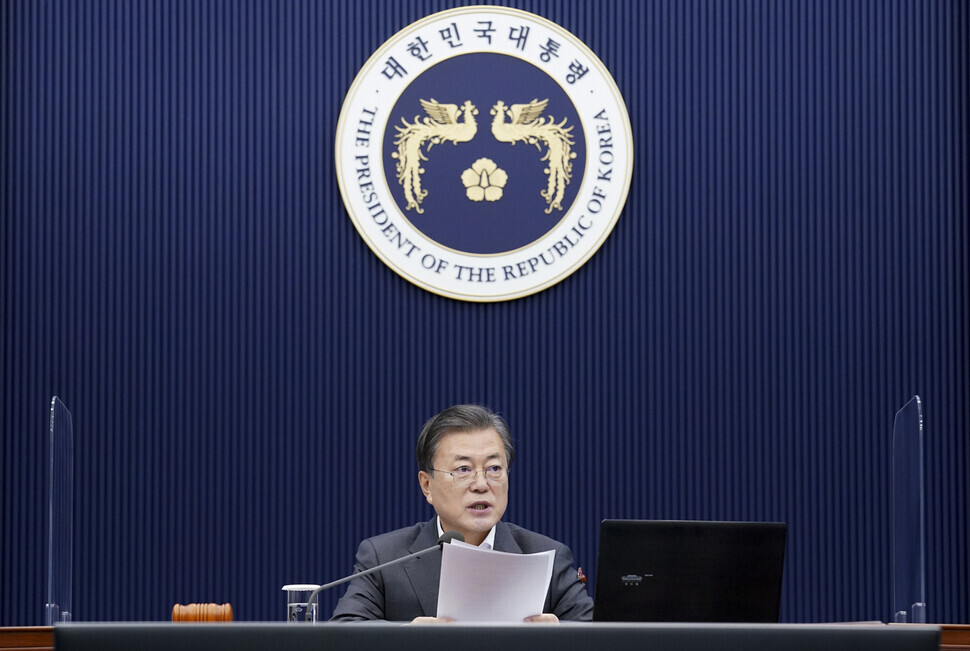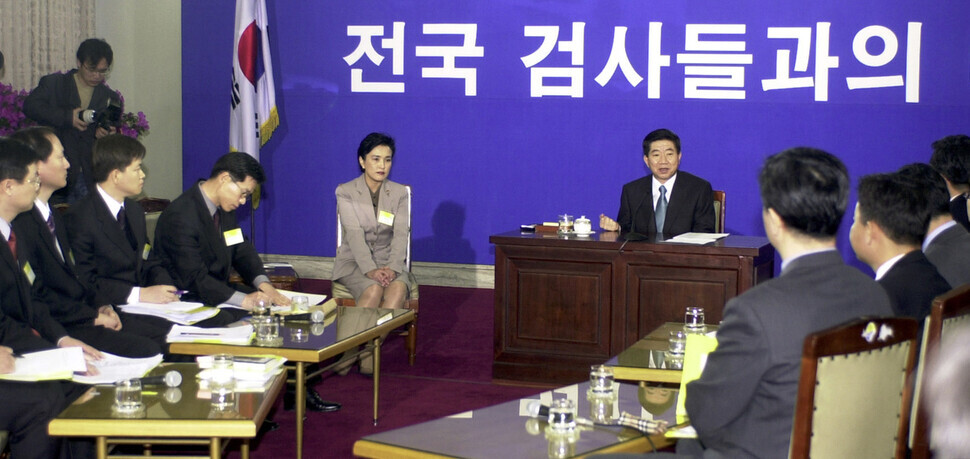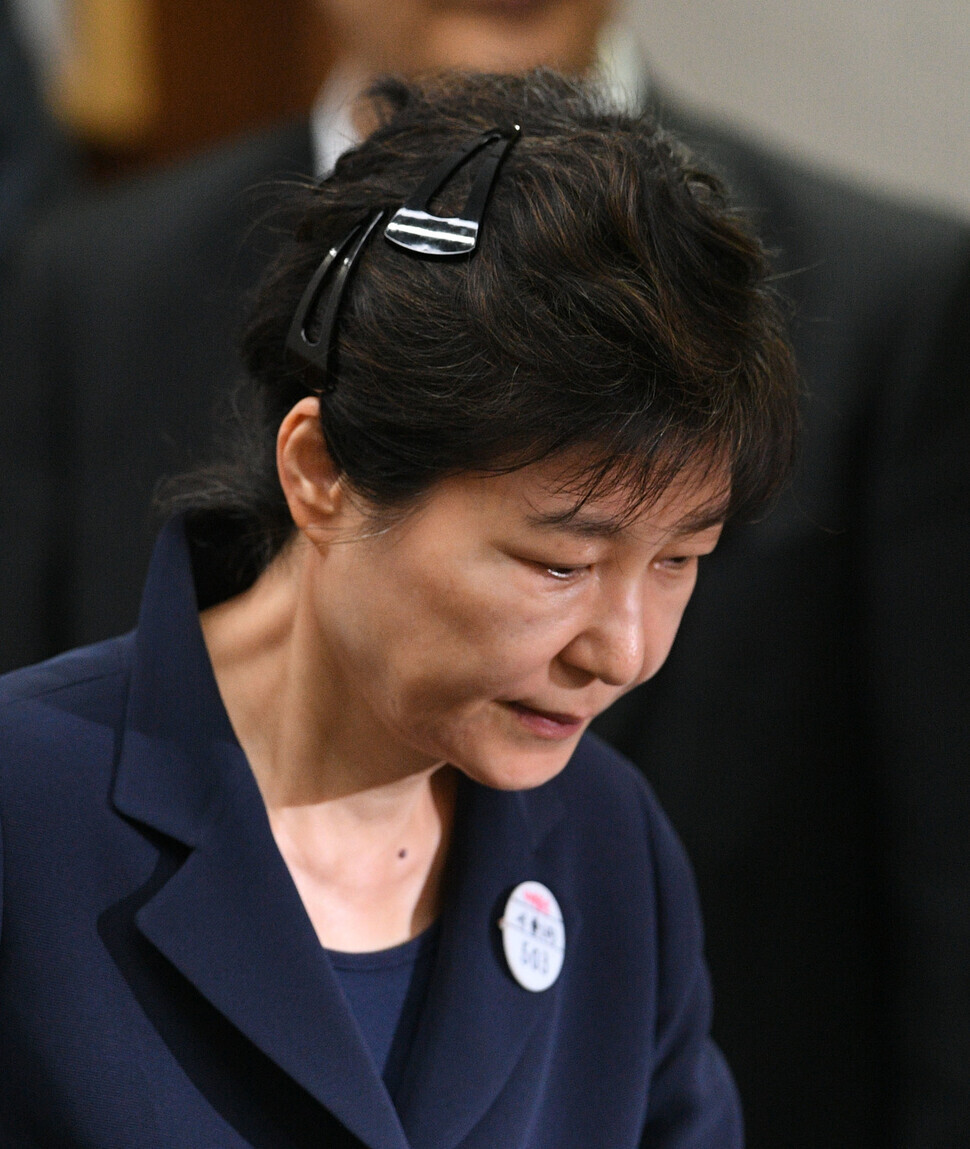hankyoreh
Links to other country sites 다른 나라 사이트 링크
Moon emphasizes CIO as necessary check against “omnipotent” authority of prosecutors

President Moon Jae-in announced amendments to the Act on the Corruption Investigation Office For High-ranking Officials (CIO), the National Intelligence Service Act and the National Police Agency Act at a cabinet meeting on Dec. 15.
“We have finally completed the institutionalization of reforms to agencies of power, which has been a longstanding ambition of democracy,” Moon said.
President Moon expressed hope that the CIO would launch without issue, noting that the office noted “is very meaningful as a democratic tool of checking the authority of prosecutors”. In a virtual cabinet meeting with the Blue House, the Central Government Complex in Seoul, and the Government Complex in Sejong on the morning of Dec. 15, the president conveyed his thoughts on the announced reforms to laws on agencies of power.
“[This] will serve as the cornerstone of ensuring that agencies of power operate in accordance with the principle of checks and balances and can be reborn as institutions that serve only the public,” the president said.

Moon used the expression “undoubtedly a historic event” in reference to the institutionally supportive role these reforms will play in fulfilling his campaign promise of overhauling agencies of power.
While the president noted that “the CIO is the core of reforms to agencies of power,” he placed particular meaning on laying the foundation for a new office for investigating corruption among high-ranking officials. Conscious of the political controversy surrounding the CIO, the president explained the historic process that led to the finalization of the CIO law, and stressed the legitimacy of the body, pushing back against protests from the opposition party that “the CIO is a tool for dictatorship.”
Moon noted that discussions on the CIO began in 1996 when a civic group launched a petition for legislation in response to the slush fund scandal involving the Chun Doo-hwan and Roh Tae-woo administrations, but this failed to lead to the enactment of any laws under the Kim Dae-jung and Roh Moo-hyun governments.
“I promised [to launch] the CIO not only during the last election, but also in the 2012 election,” the president stated. “If the CIO had been in place at that time, perhaps it could have prevented the mismanagement of national affairs by the Park Geun-hye administration.” He also reminded those present that the Hannara Party, predecessor of the current People Power Party, had made the CIO one of its campaign promises in the general election back in 2004, and stated “The CIO is not an issue of ideology or partisanship.”
“Some have expressed views that the CIO is a tool for dictatorship,” the president continued. “[But] this is about forging another knife for tackling power-related corruption in the government, so it is difficult to understand how anyone could link [the CIO] to dictatorship.”
This statement was a stern rebuttal to the opposition party’s protests that in the hands of the Moon administration, the CIO will be used for political motives such as oppressing the opposition. It was also a signal that the president wishes to prevent the significance of such reforms, an important national project, from being lost. Perhaps mindful of pushback from the opposition over the Democratic Party enforcing parts of the amendment that would neutralize the opposition’s right to veto, the president once again stressed the necessity of the important role the CIO will play in keeping prosecutors in check.

While Moon did not directly mention current issues including the standoff between Justice Minister Choo Mi-ae and Prosecutor General Yoon Seok-youl, it was notable that he used the words “sanctuary” and “omnipotent authority” in reference to prosecutors and emphasized the need for controls.
“Until now, prosecutors have been endowed with omnipotent authority but have not been held accountable for their faults, developing into a ‘sanctuary of power’ where there is no way to hold them accountable,” the president said. “The CIO will serve as an institutional mechanism that makes it possible to hold prosecutors accountable for internal corruption and faults. The CIO is not a monstrous organization to undermine the power of prosecutors. It will make sure that the great power held by prosecutors becomes a force for upholding justice in our society.”
Moon also called for introspection on the part of prosecutors, saying “the public believes that checks on the power of prosecutors are necessary, and I hope that prosecutors will accept that.” He also referred to the CIO as “the lifeblood of political neutrality” and urged politicians, prosecutors, the media and civic society to monitor [its operations].
By Lee Wan, staff reporter
Please direct comments or questions to [english@hani.co.kr]

Editorial・opinion
![[Column] Park Geun-hye déjà vu in Yoon Suk-yeol [Column] Park Geun-hye déjà vu in Yoon Suk-yeol](https://flexible.img.hani.co.kr/flexible/normal/500/300/imgdb/original/2024/0424/651713945113788.jpg) [Column] Park Geun-hye déjà vu in Yoon Suk-yeol
[Column] Park Geun-hye déjà vu in Yoon Suk-yeol![[Editorial] New weight of N. Korea’s nuclear threats makes dialogue all the more urgent [Editorial] New weight of N. Korea’s nuclear threats makes dialogue all the more urgent](https://flexible.img.hani.co.kr/flexible/normal/500/300/imgdb/original/2024/0424/7317139454662664.jpg) [Editorial] New weight of N. Korea’s nuclear threats makes dialogue all the more urgent
[Editorial] New weight of N. Korea’s nuclear threats makes dialogue all the more urgent- [Guest essay] The real reason Korea’s new right wants to dub Rhee a founding father
- [Column] ‘Choson’: Is it time we start referring to N. Korea in its own terms?
- [Editorial] Japan’s rewriting of history with Korea has gone too far
- [Column] The president’s questionable capacity for dialogue
- [Column] Are chaebol firms just pizza pies for families to divvy up as they please?
- [Column] Has Korea, too, crossed the Rubicon on China?
- [Correspondent’s column] In Japan’s alliance with US, echoes of its past alliances with UK
- [Editorial] Does Yoon think the Korean public is wrong?
Most viewed articles
- 1‘We must say no’: Seoul defense chief on Korean, USFK involvement in hypothetical Taiwan crisis
- 2N. Korean delegation’s trip to Iran shows how Pyongyang is leveraging ties with Moscow
- 3‘Weddingflation’ breaks the bank for Korean couples-to-be
- 4Korea sees more deaths than births for 52nd consecutive month in February
- 5[Column] Park Geun-hye déjà vu in Yoon Suk-yeol
- 6Will NewJeans end up collateral damage in internal feud at K-pop juggernaut Hybe?
- 7[Column] Has Korea, too, crossed the Rubicon on China?
- 8Amnesty notes ‘erosion’ of freedom of expression in Korea in annual human rights report
- 9Samsung barricades office as unionized workers strike for better conditions
- 10[Column] The clock is ticking for Korea’s first lady